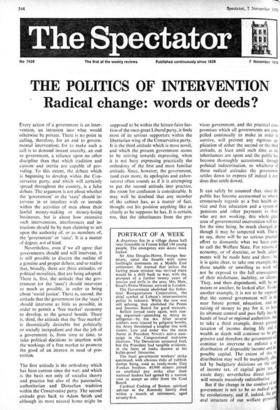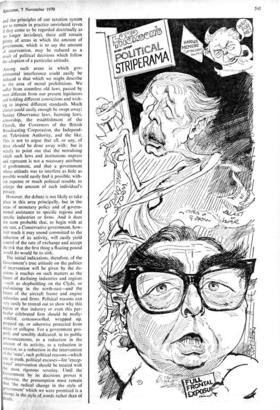THE POLITICS OF INTERVENTION Radical change: words or deeds?
Every action of a government is an inter- vention, an intrusion into what would otherwise be private. There is no point in calling, therefore, for an end to govern- mental intervention; for to make such a call is to demand instant anarchy, an end to government, a reliance upon no other discipline than that which tradition and custom and inertia are capable of pro- viding. To this extent, the debate which is beginning to develop within the Con- servative party, and which will certainly spread throughout the country, is a false debate. The argument is not about whether the 'government' or the 'state' should in- tervene in or interfere with or intrude within the activities of men about their lawful money-making or money-losing businesses, but is about how extensive such interventions, interferences and in- trusions should be by men claiming to act upon the authority of, or as members of, the 'government' or 'state'. It is a matter of degree, not of kind.
Nevertheless, even if we all agree that governments should and will intervene, it is still possible to discern the outline of a genuine and proper debate, and to realise that, broadly, there are three attitudes, or political moralities, that are being adopted. There is, first, the attitude that the gov- ernment (or the 'state') should intervene as much as possible, in order to bring about 'social justice'. There is, second, the attitude that the government (or the 'state') should intervene as little as possible, in order to permit a 'free market' economy to develop, to the general benefit. There is, third, the attitude that the 'free market' is theoretically desirable but politically or socially inexpedient and that the job of a government is, from time to time, to take political decisions to interfere with the workings of a free market to promote the good of an interest in need of pro- tection.
The first attitude is the orthodoxy which has been current since the war; and which is the basis not only of socialist theory and practice but also of the paternalist, authoritarian and Disraelian tradition within the Conservative party. The second attitude goes back to Adam Smith and although its most natural home might be supposed to be within the laissez-faire fac- tion of the once-great Liberal party, it finds most of its serious supporters within the libertarian wing of the Conservative party. It is the third attitude which is most novel, and which the present government seems to be striving towards expressing, when it is not busy expressing practically the orthodoxy of the first and most familiar attitude. Since, however, the government, (and even more, its apologists and exhor- tators) often sounds as if it is attempting to put the second attitude into practice, the room for confusion is considerable. It may well be doubted that any member of the cabinet has, as a matter of fact, thought out his position anything like as clearly as he supposes he has. It is certain, too, that the inheritances from the pre- vious government, and the practical corn. promises which all governments are com- pelled continually to make in order to survive, will prevent any rigorous ap- plication of either the second or the third attitude, at least until such time as the inheritances are spent and the public has become thoroughly accustomed, through political indoctrination, to whichever of these radical attitudes the government settles down to express (if indeed it ever does thus settle down).
It can safely be assumed that, since the public has become accustomed to what it erroneously regards as a free health ser- vice and free education and a system of pensions and other payments to those who are not working, this whole great area of governmental intervention will not, for the time being, be much changed, al- though it may be tampered with. That is to say, there will be no serious practical effort to dismantle what we have come to call the Welfare State. For reasons of economy, or of doctrine, or both, adjust- ments will be made here and there: but it is quite clear, to take one example, Mat those unable or unwilling to work will not be exposed to the full consequences of their misfortune, inability, or idleness. They, and their dependants, will, by one means or another, be looked after. To take another example, it is not to be supposed that the central government will in the near future permit, education, and the raising of money to pay for it, to kV its ultimate control and pass fully into the hands of local or regional authorities. And to take a third example, direct personal taxation of income during life and of wealth at death will continue to be and therefore the government continue to intervene to enforce a 17 distribution of disposable income and dosable capital. The extent of this et distribution may well be marginally affec' ted by budgetary decisions on the rates of income tax, of capital gains estate duty; nevertheless direct taxa° will remain massively redistributive. But if the change in the conduct of 041 government is not to be so radical as be revolutionary, and if, indeed, thef eral structure of our welfare prov040 and the principles of our taxation system are to remain in practice unviolated (even if they come to be regarded doctrinally as no longer inviolate), there still remain plenty of areas in which the amount of government, which is to say the amount of intervention, may be reduced as a result of political decisions which follow the adoption of a particular attitude.
Among such areas in which gov- ernmental interference could easily be reduced is that which we might describe as the area of moral prohibitions. We suffer from countless old laws, passed by men different from our present legislators and holding different convictions and wish- ing to impose different standards. Much clutter could easily enough be swept away: Sunday Observance laws, licensing laws, censorship, the establishment of the Church, the Governors of the British Broadcasting Corporation, the Independ- ent Television Authority, and the like. This is not to argue that all, or any, of these should be done away with: but is merely to point out that the moralising which such laws and institutions express and represent is not a necessary attribute of government, and that a government whose attitude was to interfere as little as possible would easily find it possible, with- out expense or much political trouble, to enlarge the amount of each individual's privacy.
However, the debate is not likely to take place in this area principally, but in the areas of monetary policy and of govern- mental assistance to specific regions and specific industries or firms. And it does not seem probable that, to begin with at any rate, a Conservative government, how- ever much it may sound committed to the reduction of its activity, will easily yield control of the rate of exchange and accept the risk that the first thing a floating pound would do would be to sink.
The initial indications, therefore, of the Government's true attitude on the politics of intervention will be given by the de- cisions it reaches on such matters as the future of declining industries and regions —such as shipbuilding on the Clyde, or coal-mining in the north-east—and the future of the aircraft frame and engine industries and firms. Political reasons can very easily be trotted out to show why this region or that industry or even this par- ticular celebrated firm should be molly- coddled, cottonwoolled, wrapped up, Propped up, or otherwise protected from decay or collapse. For a government pro- perly and sensibly dedicated, in its public Pronouncements , to a reduction in the amount of its activity, to a reduction in taxation, to a reduction in the intervention Of the 'state', such political reasons—which are. in truth, political excuses—for 'excep- tional intervention should be treated with the most rigorous scrutiny. Until the Government by its decisions proves it otherwise, the presumption must remain that 'the radical change in the style of overnment' which we were promised is a hange in the style of words rather than of eeds.























































 Previous page
Previous page